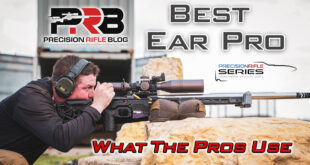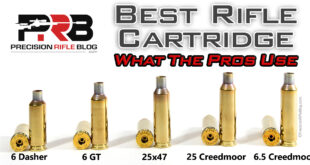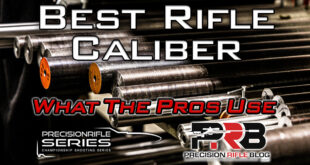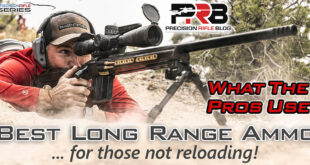This post is about what scopes and reticles the best precision rifle shooters are using. It is based on what the top 50 long-range shooters nationwide brought with them to the Precision Rifle Series (PRS) Finale a couple weeks ago. Target engagements for a PRS match can range from 25 to 1,200+ yards, but there is definitely a focus on the “precision” rifle part regardless of the range. For more info on who these guys are, and why you should care what they think scroll to the bottom of this article.
Best Long-Range Scope

It probably didn’t surprise anyone that Schmidt & Bender continued to be the scope of choice among the pros. 40% of all shooters were running an S&B scope. That is pretty dominating. It takes the next 3 most popular brands combined to beat the number of Schmidt & Bender scopes represented at the finale.
Bushnell and Vortex both gained a little ground this year, while Premier and U.S. Optics both lost market share among these shooters. Steiner and Kahles also broke into the action this year, although it was only in small numbers. Nightforce, Leupold, and March were represented once again … but in fairly small numbers.
The only optics information gathered from the competitors was scope manufacturer and reticle, but it is pretty easy to infer the scope model from that information in most cases. There are a few that could have been a couple different models, but here are some of the most popular scopes most likely topping the pro’s long-range rifles:
| Precision Rifle Scope | Model # | Street Price* |
|---|---|---|
| Schmidt Bender PMII 5-25×56 MSR | 677-945-842-B2-A8 | $3,950 |
 |
||
| Schmidt Bender PMII 3-20×50 H2CMR | 668-945-942-B2-A8 | $3,500 |
 |
||
| Bushnell Elite Tactical 3.5-21×50 G2DMR | ET35215G | $1,400 |
 |
||
| Vortex Razor HD 5-20×50 EBR-3 MRAD | RZR-52008 | $2,000 |
 |
||
| Premier Heritage Tactical 5-25×56 | PRH-10011 | $3,200 |
 |
||
*All prices reflect what you could buy it for from a reputable dealer online as of Dec. 2013.
Best Long-Range Reticle

Last year there were 10 shooters using the MSR reticle, and that was the case again this year. But, this year it had to share the top spot with the H2CMR reticle, which gained popularity from 7 last year to 10 this year. Bushnell’s G2DMR (aka GAP) reticle held strong once again, and actually picked up one more shooter over last year. There were 3 fewer shooters using Premier scopes, so the Gen 2 XR dropped in popularity over last year. View last years results.
The reticles the majority of the shooters chose to use didn’t change much from last year’s list, but there were a couple of new-comers on the scene. Here is a list of the reticles used at this year’s finale that weren’t represented last year. There are diagrams of all of these reticles at the bottom of this article as well.
- Leupold TMR Reticle
- Horus H58 Reticle
- Nightforce NP-R1 Reticle
- Nightforce MIL-R Reticle (I think this was released within the past year)
- Kahles Advanced Milling Reticle (AMR)

The MSR reticle was the favorite among the top 20 shooters. While it had to share the top spot with the H2CMR overall, the MSR was clearly the reticle of choice among those in the chase for the top spot.
The Rise of the Christmas Tree Reticle
It seems like there is a growing number of shooters using “Christmas tree” style reticles, which allow for quick hold-offs (instead of dialing for elevation adjustment). The diagram below illustrates what I mean by “Christmas tree” reticle. It is essentially a gridded reticle that allows you to hold for elevation and wind. Most people associate these with reticles by Horus Vision, but there are now several companies offering these types of reticles. I thought it’d be interesting to look at what percent of shooters were using these compared to more standard milling reticles.


The gridded reticles still aren’t more popular than the standard milling reticle, but it may be surprising how many guys have started using them. While the format of the Precision Rifle Series matches varies, there are some that impose strict time limits or are scored in a way that promotes quick target engagement. Being able to hold for elevation and wind, instead of dialing for elevation, can shave off some time and help make you more competitive in those types of competitions. Some shooters believe the “Christmas tree” style reticles are too busy and distracting, but Todd Hodnett of Accuracy First (a very respected long-range trainer) is a huge proponent of the Horus reticles and says most shooters get used to it very quickly. Todd says you really don’t even notice the grid after you’ve used it for a while, but it’s there when you need it. He believes it also easier to correct for a follow-up shot when using one of these reticles. Here is a quick 1 minute video from Todd on this style of reticle:
Full-List of Reticles Used in 2013 PRS Finale
Here is a list of the reticles used by shooters in this year’s PRS finale, in order of popularity.
Meet The Pros
 The Precision Rifle Series (PRS) is a championship style point series race based on the best precision rifle matches nationwide. PRS matches are recognized as the major league of sniper-style rifle matches. At the end of each year, the scores from 15 different matches are evaluated and the top 50 shooters nationwide are invited to compete head to head in the PRS Finale Match. The info below is based on the equipment those pros brought with them to the most recent finale. This is a great set of data, because 50 shooters is a significant sample size, and this particular group are also considered experts among experts. Thanks to Rich Emmons for allowing me to share this info. To find out more about the PRS, check out What Is The Precision Rifle Series?
The Precision Rifle Series (PRS) is a championship style point series race based on the best precision rifle matches nationwide. PRS matches are recognized as the major league of sniper-style rifle matches. At the end of each year, the scores from 15 different matches are evaluated and the top 50 shooters nationwide are invited to compete head to head in the PRS Finale Match. The info below is based on the equipment those pros brought with them to the most recent finale. This is a great set of data, because 50 shooters is a significant sample size, and this particular group are also considered experts among experts. Thanks to Rich Emmons for allowing me to share this info. To find out more about the PRS, check out What Is The Precision Rifle Series?
Other “What The Pros Use” Articles
This post was one of a series of posts that look at the equipment the top 50 shooters in the country use. Check out these other posts:
- Best Rifle Calibers & Cartridges
- Best Long-Range Scopes
- Best Gunsmiths
- Best Actions
- Best Barrels
- Best Stocks
- Best Precision Bullets, Powders & Brass
- Best Muzzle Brake & Rifle Suppressor
- Best Shooting Rest Bags
 PrecisionRifleBlog.com A DATA-DRIVEN Approach to Precision Rifles, Optics & Gear
PrecisionRifleBlog.com A DATA-DRIVEN Approach to Precision Rifles, Optics & Gear























You don’t mention to Nikon brand. I think Nikon is attended worthily in top brands. 😀
Nice! I love a guy with a sense of humor. I’m a big fan of Nikon actually. For several years I only had one rifle, and it was topped with a Nikon Buckmaster scope. While it is an outstanding value for a hunting scope, I’ve never seen a serious long-range shooter using anything made by Nikon. Great DSLR cameras and lenses though! I still use those all the time.
I would love to see what mounts they used also……..
Great suggestion! Me too. We’ve been putting a lot of thought into what we plan to ask on the survey this year. We try to not overload these guys and be respectful of their time, but get the most details we can at the same time. We’ll consider adding a question about scope mount to the list this year.
I personally use Spuhr mounts and a couple guys at Surgeon have said good things about those too. It’d be hard to imagine a more ideal mount. It is an amazing piece of engineering, but they aren’t cheap. I like CNC’ed one-piece mounts, because you don’t have to worry about lapping them. The Spuhr is tough, super lightweight, and has a built-in bubble level which keeps you from having to hang another piece of gear off your scope or rail. The rings are at 45 degree angles and very compact so they don’t obscure the turrets. I also like that they have interfaces for things like cosine indicators (to measure angle of incline) or reflex sights. They have lots of options for different amounts of cant, ring height, and tube diameter.
I’ve heard a lot of smart shooters talk about the American Rifle Company rings and mounts being amazing. That is actually what one scope manufacturer sent me to use during the scope field test I’m running through right now. That is a strong vote of confidence.
Warne, LaRue, and Nightforce would also likely be represented among these top shooters, because they all make solid mounts you can have confidence in. Burris Signature Zee rings are nice because they essentially solved the need to lap rings with their inserts. I’ve heard a few guys recommend them, but I haven’t personally used the Burris rings … yet.
But, I’d like to see the hard data on what these shooters use. I plan to attend the PRS finale this year, so I’ll definitely be able to give a more definitive answer in a few months. Maybe these suggestions will help someone out there who is just looking for a place to start.
The venerable S&B. Even here in our local club it’s the alpha dog. My layman’s eyes can’t figure out what all the hype is about but statistics don’t lie; they’re king for a reason, I just haven’t solved the puzzle yet. Then again, I’m a Vortex fan so maybe I’m just subconsciously biased 😉
Ha! I can appreciate your skepticism. In my experience, Schmidt & Bender isn’t one of the companies that gives away scopes to these shooters … I bet most of these guys paid retail for theirs, or close to it. With the price of those scopes and the expertise of these shooters, that says a lot.
I’m working on a data-driven field test right now with 18 high-end, long-range, tactical scopes in the $1500+ price range. It includes a couple Schmidt and Benders, plus scopes from Bushnell, Hensoldt, Kahles, Leupold, March, Nightforce, Steiner, US Optics, Valdada IOR, Vortex, and Zeiss. I think it will be enlightening. I’m just one week into it at this point, but you can read about the tests I plan to run and see the exact models and full lineup at https://precisionrifleblog.com/2014/04/04/public-review-of-scope-field-tests/.
That’s impressive Cal. I’m sure I’m not alone in saying how awesome it is that you’ve devoted so much time to this. I’m a sucker for bar graphs and my schedule prevents me from conducting a lot of my own research so I’m a huge fan of “what’s working the best for the most people” comparisons so I can just follow the herd.
I didn’t mean what I said about S&B as a slight. I actually want one really bad, because everybody has one. I have no doubt they’re worth every penny. I just haven’t figured out yet what I would gain from all those extra pennies. When I see well known shooters trying other things i.e. George Gardner and Bushnell, Rick Reeves and Vortex, then I really start getting confused.
I appreciate it. I have a good friend who is an accomplished long-range shooter, and he is the ultimate S&B fan-boy. I give him a hard time about it a lot. He jokes that his S&B actually makes all the targets about 1/2 a minute larger, and takes some off his wind drift too! He is mostly joking.
And I honestly do appreciate your skepticism. I like it when people question what the popular kids are doing. And there are sharp guys like George who finished in the top 5 with something other than an S&B mounted to their rifle. That’s why I’m so anxious to get some hard data on how each performs in the field. I’m sure it will reveal some surprises, regardless of which camp you’re in.
Thanks for the comments!
I have been thinking why didn’t you mention about Nightforce products? Is the stats true show above -“Best Long-Range Scope”? My personal experience with Nightforce reticle was incredible and never felt at any point of time that it can not give competition to other scopes like Schmidt Bender, Bushnell or Vortex. Its my best rifle companion for long range shooting.
Mark, I personally own Nightforce scopes and know a lot of great shooters (like Bryan Litz) who use them. I recommend them to friends. I’m not sure there is a more durable scope available for any price. I was probably as surprised as you were when I saw how few of these top shooters run Nightforce, and I’m not sure why that’s the case … but it is.
I’m currently running a very objective field test that compares 3 Nightforce models (NXS, ATACR, & BEAST) to all the rest of these, plus a few more (18 total). There are several tests that focus on optical clarity and several that focus on mechanical precision and repeatability. I’m anxious to see what the tests reveal. My bet is Nightforce ends up somewhere in the top 25%, and it sounds like you have the same expectation. But we’ll just have to wait and see.
Well i have been great fan of Nightforce products ever since i need one for long range shooting. Trust me it was my personal experience, no other optics given me better experience than this. I surely wait for your test result. Thanks for these updates.
Super review.nothing to add
I have a question about the MSR reticles that you may or may not be able to answer. In looking at the S&B version, the “F” distance states 10 mrad, 100 cm* (at the given distance). The same portion of the reticle on the Steiner, “S”, shows a distance of 2.5 mrad. The 2.5 mrad on the Steiner corresponds with the center vertical crosshair and appears to line up with the 5 mil hash extending up 2.5 mils for the 400m, “S” distance. Additionally, “G” on the S&B is 5 mrad and the “R” on the Steiner shows 1.25. I’m still learning about milling and ranging, but this really confuses me.
Thanks for all the detail on your posts and keep them coming.
Hey DRT, I think that question might be above my pay grade! Honestly, I’m as lost as you are. The MSR reticle is actually designed by FinnAccuracy, and licensed to all of those companies. But they own the patent on the design, and make all the decisions. I’d suggest looking at their page on the MSR reticle, and seeing it as the definitive source for any details. You can also contact those guys, and see if they can help. They’ve been really responsive the couple of times I’ve contacted them with questions.
Here is a link to their page on the MSR reticle: http://www.finnaccuracy.com/msr.html
Sorry I couldn’t be more help!
Thanks,
Cal